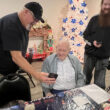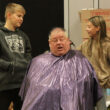Sean C. Morgan
City Council candidates who participated in a forum last week at the Sweet Home Police Department keyed in primarily on economic development and improving the city.
Those attending were candidates James Goble, Jeff Goodwin, Aaron Pye and incumbent Bruce Hobbs.
Ryan Underwood, incumbent Greg Mahler and Anay Hausner were unable to attend. The event was organized by The New Era in an effort to help engage the public and candidates. The last time Sweet Home candidates were gathered in a forum setting prior to an election was in the late 1990s.
Moderator Craig Fentiman, who is stepping down after serving on the council since 1988, asked the participants general questions about their vision for the future and how they propose to solve problems they said they see in Sweet Home.
Goble said his “long-term goal” has been to serve on the council. He has been a member on the Planning Commission, where he has helped make positive change and plans to bring it with him to the City Council, he said, and has attended council meetings for the past year and a half..
“I wanted to see which direction our city government would lead our community.”
He has taken that knowledge back to the people for their information and to get feedback, he said. He has shown he can “be a viable conduit between our city and community.”
Pye said he has followed decisions by the council over the years, and he decided he would like to be part of the decision-making process. He said he fears where he sees some things headed in the community and hopes he can help turn them around.
Hobbs said he wanted to bring a more libertarian point of view to city government. It has folks on one side or other of the political spectrum and made decisions all over the place.
“I’m afraid I’m very predictable in the way I vote,” he said.
Goodwin noted the council can affect this community in many ways, from law enforcement to placing crosswalks, so being involved is important.
He said he wouldn’t want every councilor to hold doctoral degrees, but with graduate degrees in law and business, he thinks he would bring a skill set to the council that can add to debate.
Responding to a question about where candidates see Sweet Home in 10 years, Hobbs said he is excited about that. The community has seen peaks and valleys in the past, and though “I hate to say it,” it’s been in a valley recently. Opportunities are out there now, and he sees that Sweet Home “will be quite a bright little tourist town.”
Goodwin said he believes the city will be “a place where people want to visit, a place where people want to live, to spend weekends.” In his vision, Sweet Home is a place that attracts people. The housing stock is kind of poor right now, and he would like to see if there is anything “we can do” to make it more livable.
Pye said that based on where Sweet Home has been going in the past few years, the future “kind of scares me.” He referred to empty storefronts and the apparently growing number of homeless persons as examples.
“In 10 years, we won’t have a town if something doesn’t change,” Pye said.
Goble thinks Sweet Home will have found a way to capitalize on its recreational potential, balancing livability and economic growth.
Candidates were asked to identify Sweet Home’s greatest current challenges and how, specifically, they propose to meet those challeges.
Pye said he believes it is getting businesses to locate here and provide jobs.
“Mom and Pop need a reason to have a business here,” he said. The recent Harvest Festival, with more than 40 different vendors, shows there are potential businesses, but buildings remain empty.
Pye said he is not sure how the city can promote economic growth without turning its back on state- level rules. A volunteer base might be able, but people get burned out.
At one point, the Beautification Committee had three times as many volunteers, Pye said.
“If there’s no money, we really can’t do anything,” he said, adding that throwing money at problems “doesn’t really work either.”
Goble said he believes economic growth is Sweet Home’s biggest challenge.
“We have a wide recreational resource. We have hiking, fishing, camping, a beautiful community.”
But Sweet Home has limited access to Interstate 5 and a wide mountain range that make the community look like it is not a viable resource for potential new businesses, he said.
Goble said Sweet Home has a lot of resources it can capitalize on and use, such as the Oregon Jamboree; and it needs to bring people to town, not through town on their way to Sisters or Hoodoo. It needs to draw potential businesses to town, “show them we have hard-working employees in our local community.”
Goodwin pointed to unemployment and drugs as the biggest problems he sees. Local residents need jobs, he said. The community needs to deal with the drug problem. Although he’s not sure what the best solution is, it will need to involve everyone, the Police Department, the School District and the community.
To get there, the city needs to be more aggressive in training children and providing them opportunities to work, to get used to the idea of working, he said.
“It’s one thing to have a souped-up truck and another to have bought it yourself,” Goodwin said.
The community needs to figure out how to attract the kind of industry that would fit here, he said, suggesting, for instance, a Toyota factory that would build hybrid cars.
The City Council is not an all-powerful organization, but to address drugs, the community needs to get into the schools and get students involved in music and sports so children don’t have nothing to do, Goodwin said.
Hobbs said apathy is the biggest problem he sees.
“We have a lot of people, because we’ve been going through a rough stretch, honestly starting to give up,” Hobbs said. The resulting apathy is Sweet Home’s biggest challenge, but he believes the community is on the beginning of an upswing, which will help with the homeless issue, jobs and more.
He said Sweet Home needs to re-engage its civic groups, such as the Sweet Home Economic Development Group, to bring back a position like economic development coordinator, held by Brian Hoffman most recently. Then it needs to re-initiate some of the old economic development programs and come up with ways to plan and leverage resources to bring in business.
Each candidate described a goal he hopes to fulfill.
“Bringing back our economic development coordinator,” Hobbs said. That’s someone who can be a point of contact with a finger in every part of the community. It’s someone who can connect people.
Pye said he would try to remove urban blight and revitalize the vacant buildings, something other than “for sale” signs and broken windows. Under the current government system, he doesn’t know how to accomplish it.
Goble said he would like to make the downtown look as good as the center strip running through town, “to help revitalize the downtown core so we remain a beautiful community.”
Goodwin said that goals should be measurable and attainable, “but mine may not be.”
When he interviewed for his position as an attorney with John Wittwer a year and a half ago, he brought his family to Sankey Park. He saw youths there, and he asked them why they weren’t in school. They responded, “What’s the point?”
He wants to give them a future, he said. “They don’t believe in their own future.”
Councilor Dave Trask, who is not running this year, attended the forum and asked the candidates their opinion of the council’s decision on the medical marijuana dispensary moratorium. The council chose not to implement a moratorium, unlike most cities in the state, some of which adopted one-year moratoriums and some of which adopted shorter moratoriums anticipating completion of regulations in a shorter period.
The state had permitted cities to enact a one-year moratorium so they could prepare regulations for potential dispensaries. Since then, a medical marijuana dispensary has opened in Sweet Home. Trask voted to approve the moratorium, along with Mahler. Hobbs voted against a moratorium.
Then, Trask said, “we rushed right into it and put a dispensary on Main Street.”
“That’s a very tough question,” Goble said. “Personally, I did not agree with the council’s vote. I’m neither opposed nor pro for this medicine. I think we should have put the moratorium in effect for awhile for our community. I would have to say no, I disapprove of the decision of the council.”
Hobbs said he was concerned that if the moratorium was in place, the city and council would have let it go out to its limit and expire rather than getting the job done creating regulations. The idea was to get it done quickly, “tackling and dealing with an issue we know is going to come.”
He said he “didn’t want to kick the can down the road” and wanted a more specific time frame. He didn’t feel comfortable waiting 12 months “for something the people of Oregon voted for.”
Hobbs added that the council did not “allow” marijuana dispensaries, as some have described it.
“We didn’t put the dispensary there,” he said.
Most medical marijuana card holders have other sources, and he asked why not shuttle them to another town to get their marijuana.
He also wondered about the new dispensary after the upcoming election, he said. “What will become of it if somehow marijuana is legalized?”
Goodwin acknowledged that some marijuana may save lives, but for most “it’s just an excuse for drug use.”
The cards are handed out like candy, Goodwin said. It was a mistake not to pass the moratorium.
“If the pharmacies won’t sell medical marijuana, what does that tell you about its use as a medication?” Goodwin said. “This isn’t selling medicine. It’s selling drugs.”




